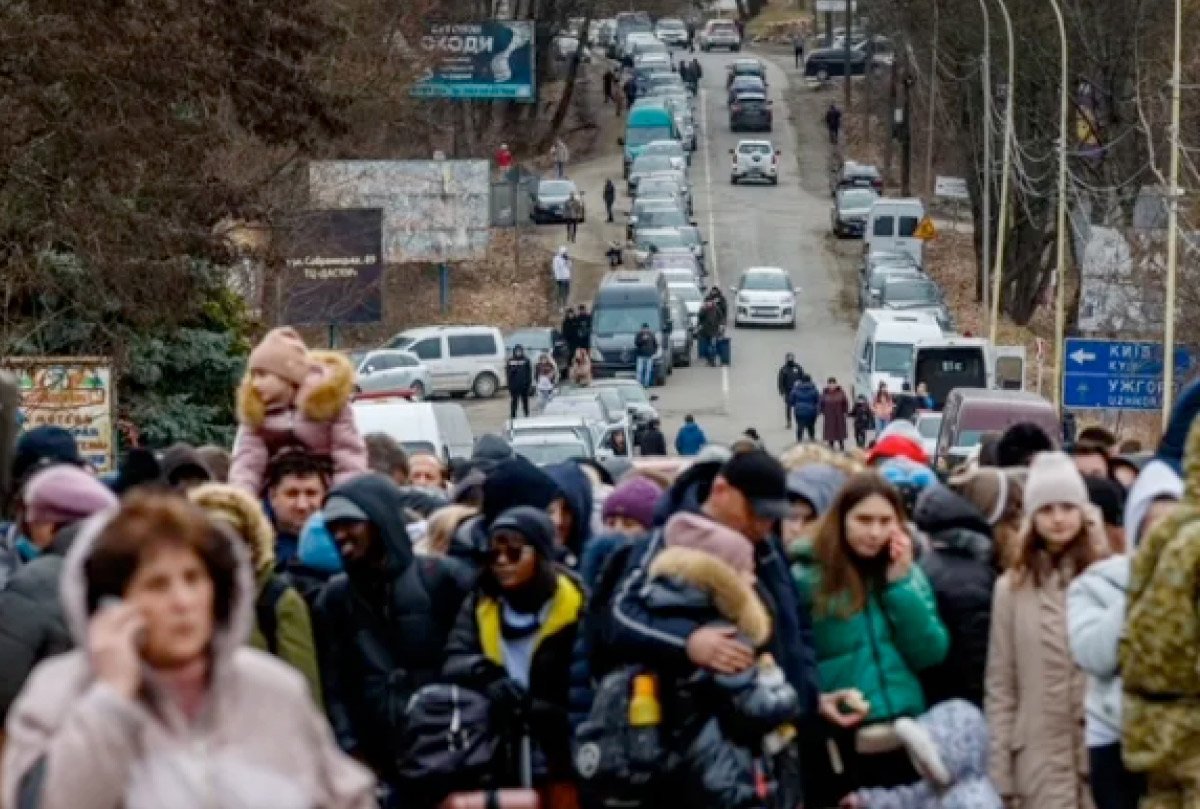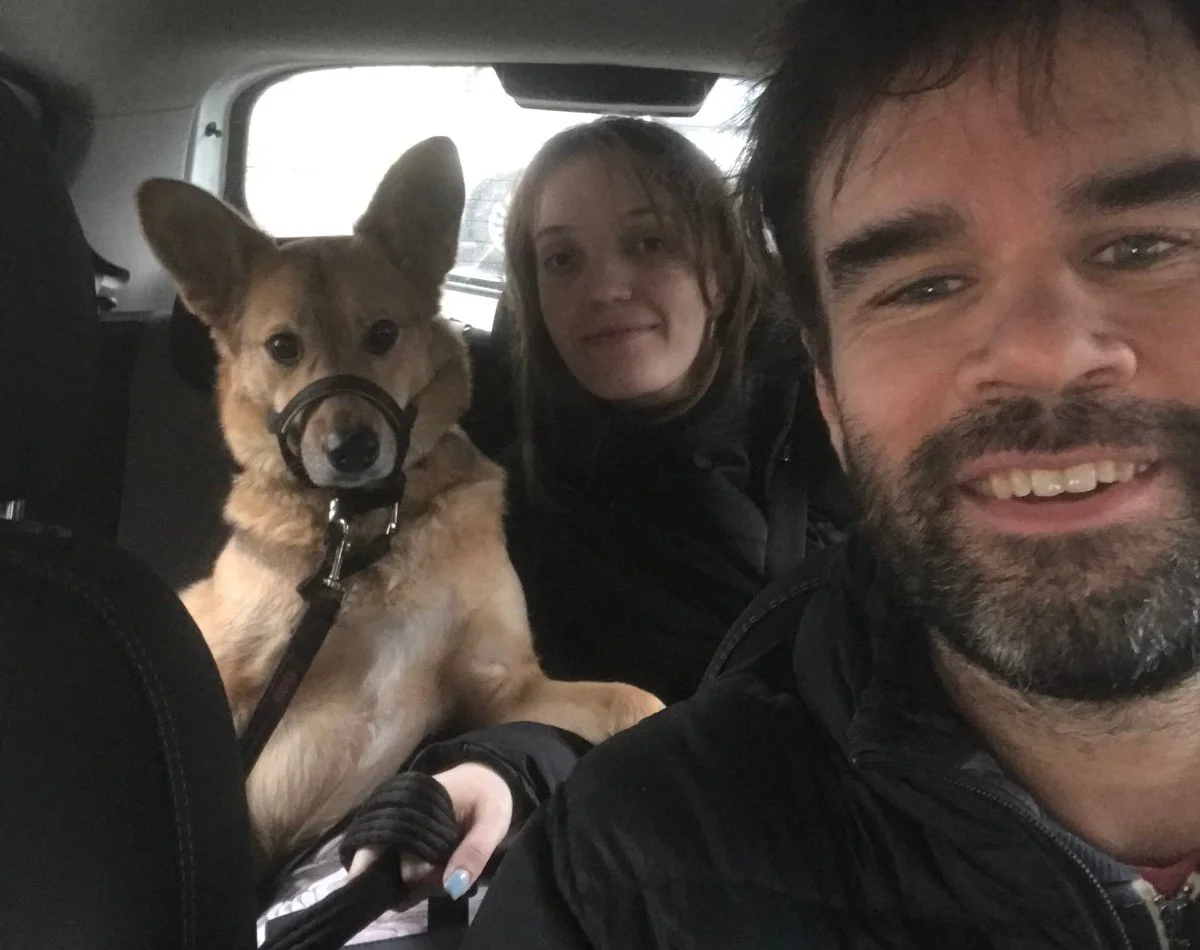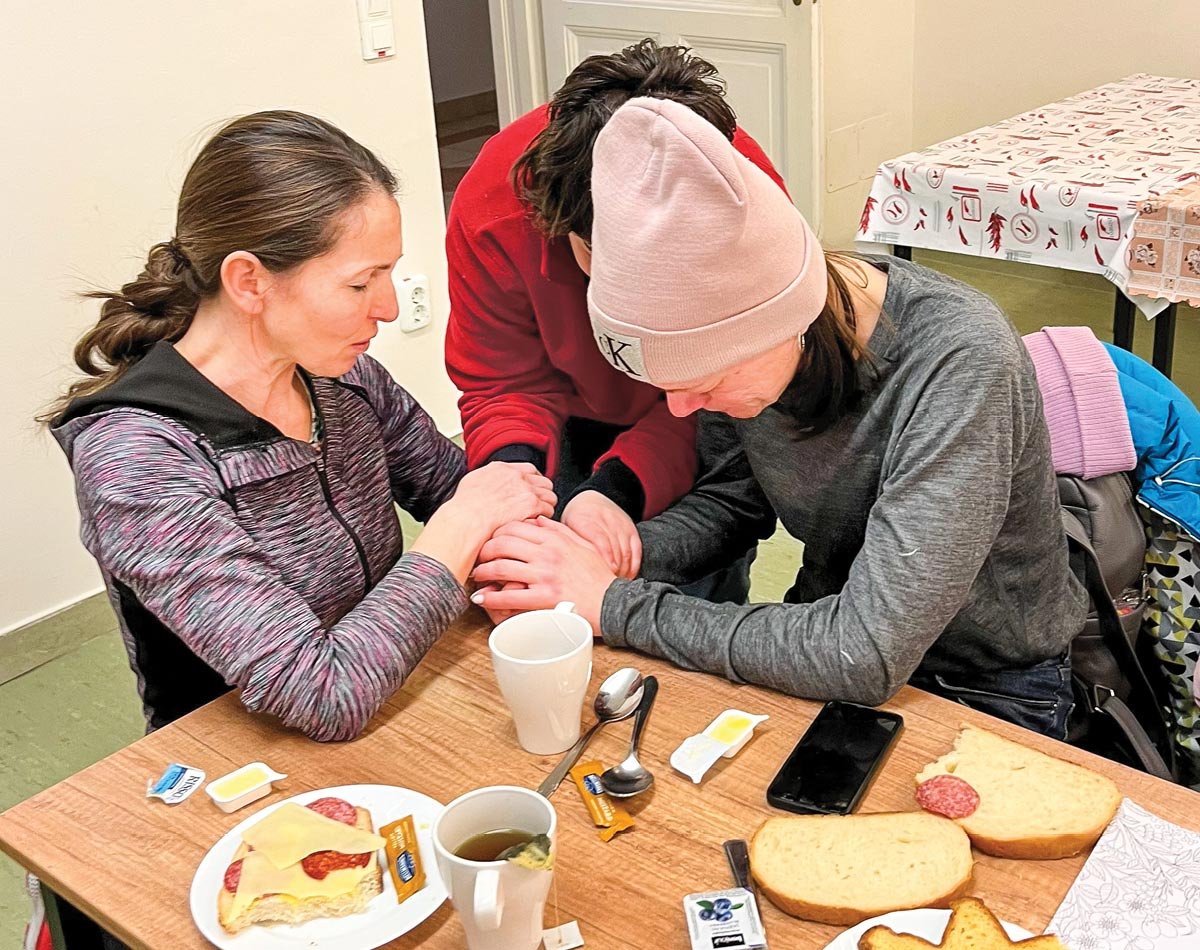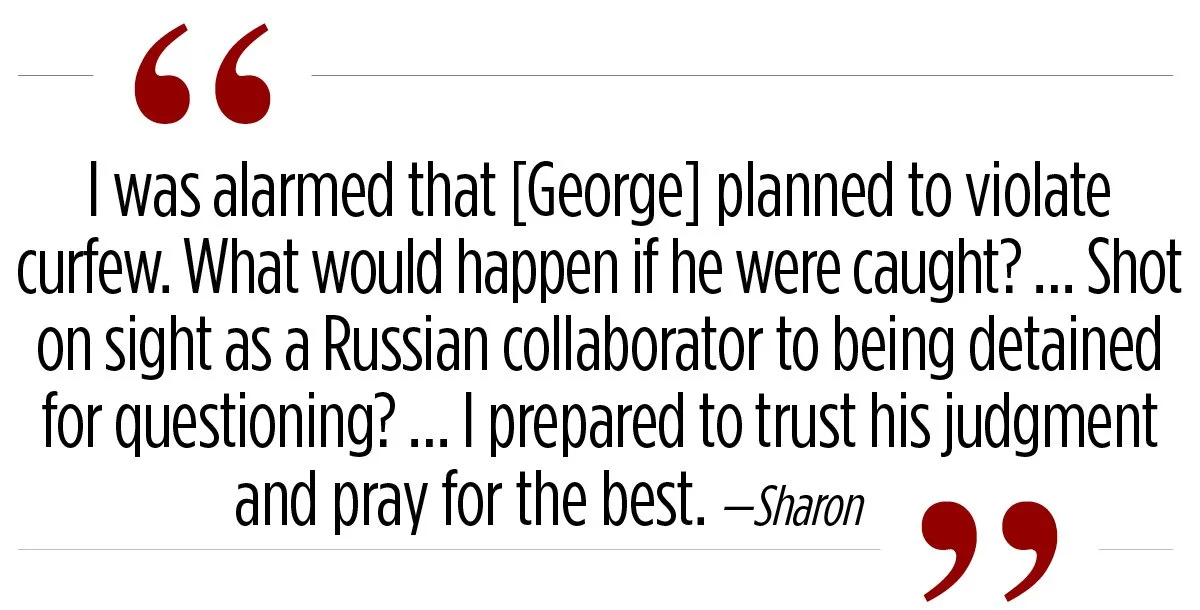As Missiles Fall, Kyivans Flee the City
Photos courtesy of Sharon T. Markey unless otherwise noted
Familiar with years of Russian aggression, missionaries Sharon and George Markey, Jr., never thought they would leave their beloved adopted country, even with the new threats of a Russian invasion. Under advisement, Sharon and the boys had evacuated to western Ukraine, leaving George in Kyiv. In Part 3 of this 9-part series, as bombing begins in Kyiv, Sharon retells George’s attempt to leave the city.
Home to about four million people, Kyiv was struck by Russian missiles on February 24, 2022, forcing nearly 100,000 people to flee their homes that day—on foot and in cars.
Kyiv, Ukraine
February 24, 2022, 4:30 a.m.
The night before the start of the war, George and the seven other members of our team met and prayed and decided that if Russia invaded, they would all evacuate from Kyiv. Early the next morning, when the sounds of explosions jolted everyone from sleep, they all gathered at our apartment. At a time like that, you want to be with other people, and our apartment had a private basement to serve as a bomb shelter plus stores of non-perishable food and water that I had been gathering for weeks.
Early that Thursday morning, Anastasia, the friend with whom George had planned to leave Kyiv after the weekend, agreed to come pick him up on her way out of the city with her son and take him at least as far as Ternopil. Anastasia said she had another free seat in her car, so George talked to the rest of our team about who should go with him. Everyone agreed that it should be Olya. Not only did Olya have family in the Ternopil region, she was also practically a member of our family, and everyone insisted that she have the extra seat. Olya fought hard against the decision. She couldn’t stand the thought of leaving everyone else behind, but it didn’t make sense to waste the opportunity to get another person out of the city safely. Ultimately, the decision of the majority prevailed, and Olya frantically packed some things in a wheeled carry-on suitcase and a backpack.
George was nearly ready to go, because he had already packed a small suitcase in anticipation of the planned Monday trip. Now all he needed to do was throw a few things in his backpack. As he worked, he was constantly on his phone, either talking or texting, trying to get a handle on the situation in the country and how he could help.
Anastasia showed up by 7:00 a.m. Everyone gathered in our apartment entrance to see George and Olya off. It was a horrible, heart-wrenching goodbye. Everyone was crying, not knowing if they would ever meet again in this life. There were hugs all around, and those last, desperate embraces tried to communicate what throats constricted with tears could not.
Oh God, what’s going to happen?
Will I ever see you again?
I love you so much.
Goodbye …
Anastasia’s car was totally full. There didn’t even appear to be any space for George and Olya. But somehow they managed to repack things to fit in George and Olya’s luggage and clear the seats they were supposed to sit in. Olya squeezed into the back beside a cage containing a parrot, and George wedged himself in the front passenger seat with Jack, our medium-large German shepherd mix, on the floor between his legs. Thankfully, our two pet rats had gone to Ternopil with our older boys.
For weeks Anastasia had been keeping her gas tank constantly full in case she and her son had to evacuate, but as several dates proposed on social media for the planned invasion came and went uneventfully, she had let her guard down.
Now, when it mattered, she only had a half tank of fuel and a half tank of propane in her modified car. She stopped at the first gas station they saw, not far from our apartment. There was a line of about fifteen cars, and George wanted to keep going and stop once they had gotten outside the city, but Anastasia insisted they needed to get gas immediately because the lines were only going to get worse. Consumed with guilt over leaving the others behind, Olya just wanted to abandon the plan entirely and walk back to our apartment by herself.
“Don’t you even think about it!” Anastasia snapped.
Olya stayed put in the car.
There was no line for the propane, and the other drivers let them through to the propane tank. The gas station was only accepting cash, and Anastasia and Olya didn’t have much with them. Uncharacteristically, George had a wad of Ukrainian hryvnias on him that day, so they were able to pay. An attendant gave them propane, and when Anastasia tipped him, he asked if they needed gasoline too and gave it to them without making them wait in line. George then gave him another big tip—and a banana—and they got back on the road.
As they left the gas station, Anastasia, who had attended our church for the first time the previous Sunday, asked George to pray. Up until this point, prayer for Anastasia had meant voicing her requests to “the Universe,” but that day, she wanted to pray to the God of the Bible. Prayer became an increasingly important part of the hours that followed.
“Call to Me, and I will answer you, and show you great and mighty things, which you do not know.” Jeremiah 33:3
The plan was to go to Anastasia’s mom’s apartment on the western edge of the city, have breakfast there, and then continue on. Her mom was adamant about not leaving her home, so she would be staying in Kyiv. As they left the gas station, the GPS navigation indicated it would take 45 minutes to get to the mom’s apartment, but as they drove, the time estimate kept increasing, and the route kept changing. People were pouring onto the roads, lines at the gas stations were at least twice as long as they had been previously, and traffic slowed practically to a standstill. In their panic, many people were getting in car accidents. Cars abandoned by the side of the road became a common sight. Some had been ditched after an accident; others appeared simply to have run out of gas. Desperate families continued on foot. It was heartbreaking.
It took them over three hours to get to Anastasia’s mom’s apartment. By the time they got there, they had decided not to continue on that day. The fighting around Kyiv was fierce, and they thought they’d be safer waiting in the city rather than sitting for hours in traffic on an open highway, easy targets for any Russian fighter pilots or tank or artillery operators. They went up to the mom’s apartment and had tea and talked. They prayed together yet again, and Anastasia joined in with a heartfelt, impassioned prayer to God. After that, George and Olya left with our dog.
George Markey, Jr., Olya, and Jack the dog try to leave Kyiv—only to return hours later. Roads congested with vehicles, foot traffic, and abandoned cars slowed their progress, leaving them vulnerable on the open road in the night if they continued.
Using the app for the car-sharing fleet that our car had been a part of, they easily found an available car parked nearby. The drive back to our apartment took a mere 15 minutes because the roads were all deserted going in that direction. Their plan was to wait out the weekend and then leave with Anastasia on Monday after the roads had cleared. It was noon on Thursday.
Everyone was still at our apartment when George and Olya returned, and there was great rejoicing at that reunion. In the intervening hours, more people arrived to shelter there because they felt safer being in an apartment with a basement.
Almost immediately after the invasion started, we began to hear reports that Russia had placed agents in strategic Ukrainian cities ahead of time. They had been living in our midst for months—renting apartments next to us, shopping at the grocery store with us—waiting to be activated. The day before the invasion began, there had been groups of suspicious, Russian-speaking fellows loitering in our neighborhood until the police came and dispersed them. I need to be clear that they weren’t suspicious because of the language they spoke—many Kyivans speak Russian. They were suspicious because of the way they carried themselves and the way they seemed to be waiting for something. They clearly weren’t just groups of friends hanging out. All that, combined with the language they spoke, made them suspect.
I don’t know all that these agents were trained to do, but once the invasion started, people began to notice strange markings in reflective paint on buildings all around Ukraine, and everyone was told to remove or cover up any such markings that they saw. The father of one of our kids’ classmates actually caught a man in the process of applying one of these markings, and he and another man were able to restrain him until the police arrived to arrest him. Learning about these Russian agents was a chilling confirmation that my concern for George’s safety had not been completely misplaced. George was sobered and apologized for not having taken me seriously. We switched to a secure messaging app for all of our communications and told everyone who knew of George’s whereabouts not to share that information anywhere online.
For He shall give His angels charge over you, to keep you in all your ways.
Psalm 91:11
In a scene that would become all too familiar as more Ukrainians flee to nearby countries, people pray, seeking God—some for the first times in their lives. Volunteer Naomi (left) from Calvary Chapel York, England, prays and shares the love of Jesus with refugees arriving at Zichy Castle in Vajta, Hungary. The castle originally served as CC Bible College under Pastor Chuck Smith; the Bible College is now located in Tbilisi, Georgia, under the leadership of George Markey, Jr's., mother, Pam Markey. Photo by Billy Rutledge
Once back at our apartment on that first day of the invasion, George contacted our chaplain friend to see what she thought of his plan to wait until Monday to leave the city. She was insistent that he had to do everything he could to get out of Kyiv the very next day. Late that night, Anastasia decided that she would leave her mom's apartment at 7:00 a.m. sharp the next morning and gave George a rendezvous point nearby. Martial law had been declared, and there was a curfew in effect until 7:00 a.m., but George agreed to the plan without having any idea how he was going to travel across the city during curfew.
When I found out, I was alarmed that he was planning to violate the curfew. What would happen to him if he were caught? The Ukrainians around me whom I asked had various theories that ranged from George being shot on sight as a Russian collaborator to being detained for questioning. They all sounded like really bad outcomes to me, but characteristically, George didn’t share my concern. He said that he’d read on a government Telegram channel that the police would simply be checking the documents of anyone who was out during curfew.
I was so desperate for George to get to safety that I didn’t have the emotional resources for another argument about what course of action he should take. If he truly believed that violating the curfew to rendezvous with Anastasia was the best way for him to leave the city, I was prepared to trust his judgment and pray for the best.
Disappointed, George must come up with another plan to leave Kyiv, delaying his reunion with Sharon. In Part 4, tormented with anxiety and stress, Sharon prays for wisdom—should she stay and wait for George or leave for safety in another country?
Follow this series at:
Part 1: The Looming Reality of War
Part 2: Alone in a Country at War
_______________
Sharon T. Markey was a Calvary Chapel missionary in Ukraine for 19 years prior to the full-scale Russian invasion. Her husband George served there for 30 years as a Calvary Chapel church planter. Since evacuating to Hungary with their six sons, they have been ministering to Ukrainian refugees all over the country. Sharon is writing a book about their experiences. You can connect with her at MommyJoys.com
Thank you for reading this article! If you enjoyed reading this story, we ask that you consider partnering with us to continue this ministry God began 25 years ago. We offer these stories and testimonies several times a week for free, but it's not without extensive costs to this small non-profit. We are funded only through the donations and partnerships from the print magazine. Your gifts will be put into use immediately—transforming lives through the power of the Gospel! Not only will you be blessed by what God is doing in Calvary Chapels around the world, but you will also help provide these stories digitally for those who don't have access to a physical copy—this includes missionaries! We know you have a lot of choices when it comes to giving, so we thank you in advance for prayerfully considering joining us in this ministry to help us reach MORE souls for Jesus.
SPONSOR MESSAGE: Learn how you can receive a top-tier educational degree from a biblical perspective with Calvary Chapel University, a fully accredited school which is 100% online.
© 2024 Calvary Chapel Magazine (CCM). All rights reserved. Articles or photographs may not be reproduced without the written permission of CCM. All Scripture quotations, unless otherwise indicated, are taken from the New King James Version. Copyright © 1982 by Thomas Nelson, Inc.® Used by permission.








